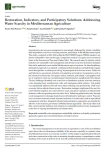Perrino E.V., Zdruli P., Piscitelli L., D'Agostino D. (2025). Restoration, indicators, and participatory solutions: addressing water scarcity in Mediterranean agriculture. Agronomy, 01/07/2025, vol. 15, n. 7, p. 1517.
https://doi.org/10.3390/agronomy15071517
https://doi.org/10.3390/agronomy15071517
| Titre : | Restoration, indicators, and participatory solutions: addressing water scarcity in Mediterranean agriculture (2025) |
| Auteurs : | E.V. Perrino ; P. Zdruli ; L. Piscitelli ; D. D'Agostino |
| Type de document : | Article |
| Dans : | Agronomy (vol. 15, n. 7, July 2025) |
| Article en page(s) : | p. 1517 |
| Langues : | Anglais |
| Langues du résumé : | Anglais |
| Catégories : |
Catégories principales 07 - ENVIRONNEMENT ; 7.3 - Eau. Gestion de l'EauThésaurus IAMM GESTION DES EAUX ; EAU DISPONIBLE ; RESSOURCE EN EAU ; RESTAURATION ECOLOGIQUE ; AGRICULTURE ; SYSTEME DE PRODUCTION ; REGION MEDITERRANEENNE ; ITALIE |
| Résumé : | Agricultural water resource management is increasingly challenged by climate variability, land degradation, and socio-economic pressures, particularly in the Mediterranean region. This study, conducted in 2023-2024 within the REACT4MED project (PRIMA initiative), addresses sustainable water use through a comparative analysis of organic and conventional farms in the Stornara and Tara area (Puglia, Italy). The research aimed to identify critical indicators for sustainable water management and develop ecosystem restoration strategies that can be replicated across similar Mediterranean agro-ecosystems. An interdisciplinary, participatory approach was adopted, combining technical analyses and stakeholder engagement through three workshops involving 30 participants from diverse sectors. Fieldwork and laboratory assessments included soil sampling and analysis of parameters such as pH, electrical conductivity, soil organic carbon, nutrients, and salinity. Cartographic studies of vegetation, land use, and pedological characterization supplemented the dataset. The key challenges identified were water loss in distribution systems, seawater intrusion, water pumping from unauthorized wells, and inadequate public policies. Soil quality was significantly influenced by salt stress, hence affecting crop productivity, while socio-economic factors affected farm income. Restoration strategies emphasized the need for water-efficient irrigation, less water-intensive crops, and green vegetation in infrastructure channels while incorporating also the native flora. Enhancing plant biodiversity through weed management in drainage channels proved beneficial for pathogen control. Proposed socio-economic measures include increased inclusion of women and youth in agricultural management activities. Integrated technical and participatory approaches are essential for effective water resource governance in Mediterranean agriculture. This study offers scalable, context-specific indicators and solutions for sustainable land and water management in the face of ongoing desertification and climate stress. |
| Cote : | En ligne |
| URL / DOI : | https://doi.org/10.3390/agronomy15071517 |







